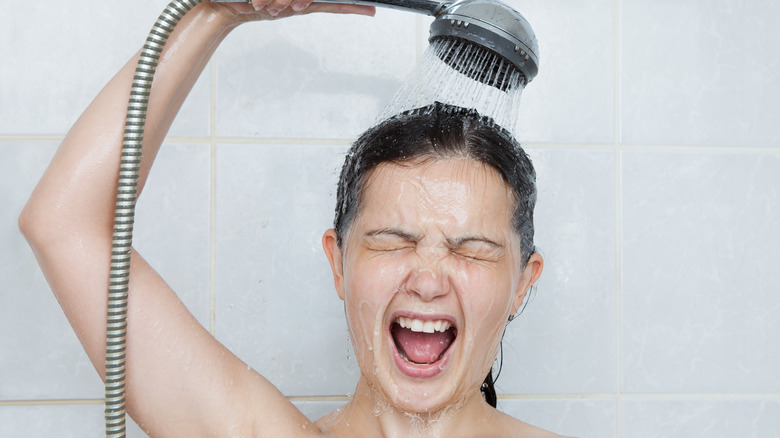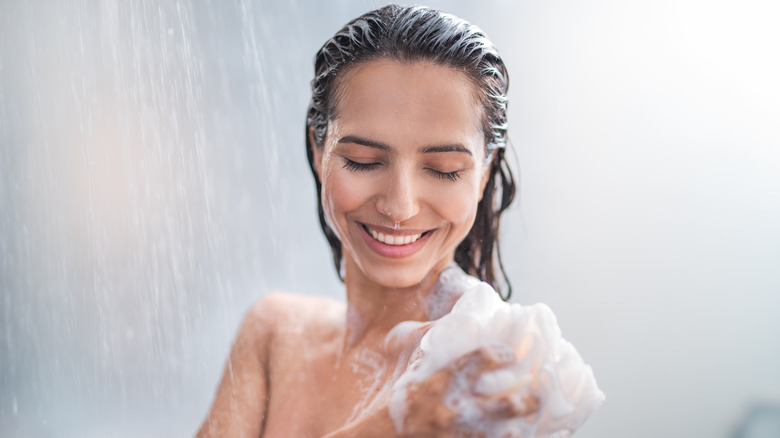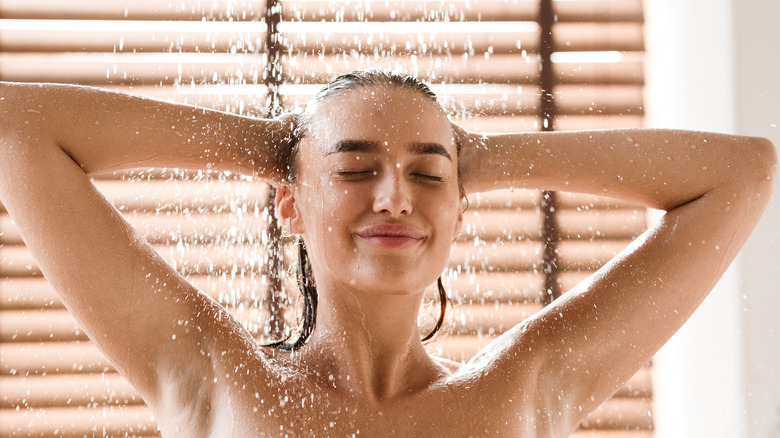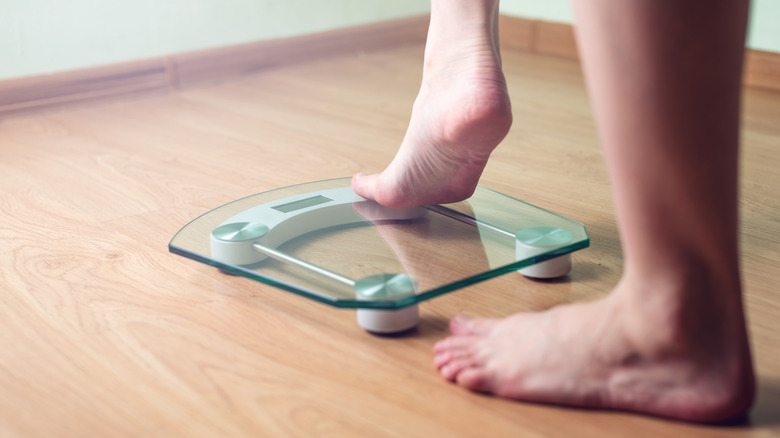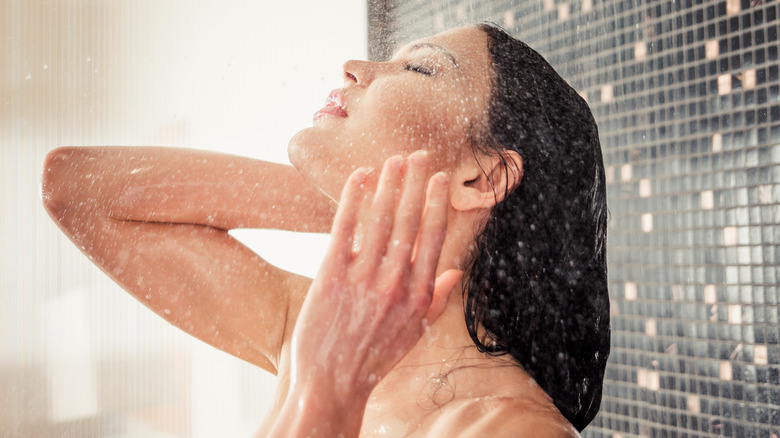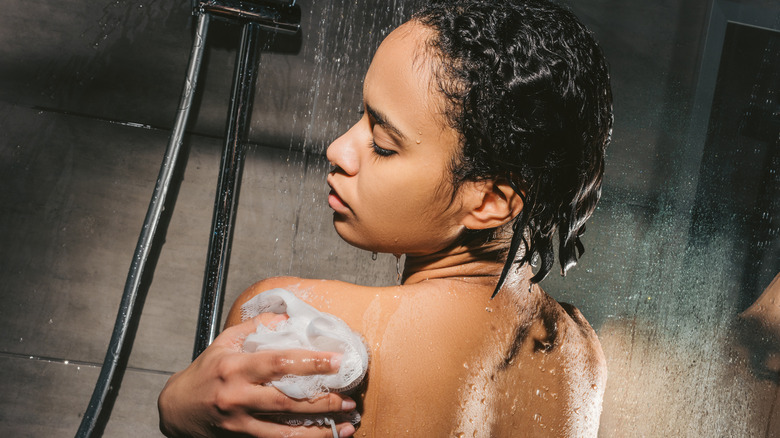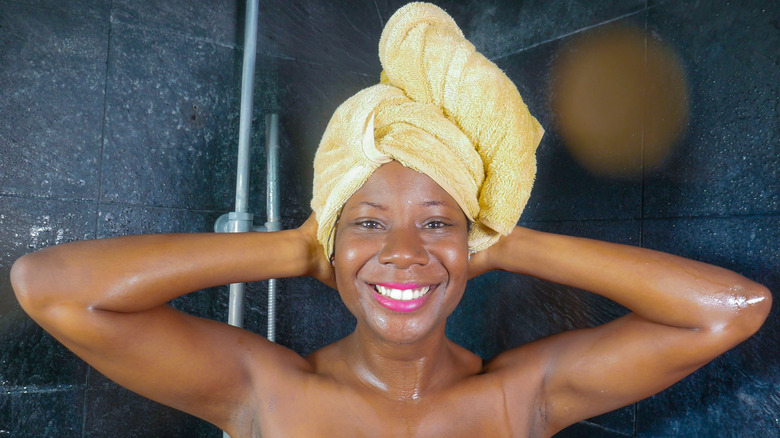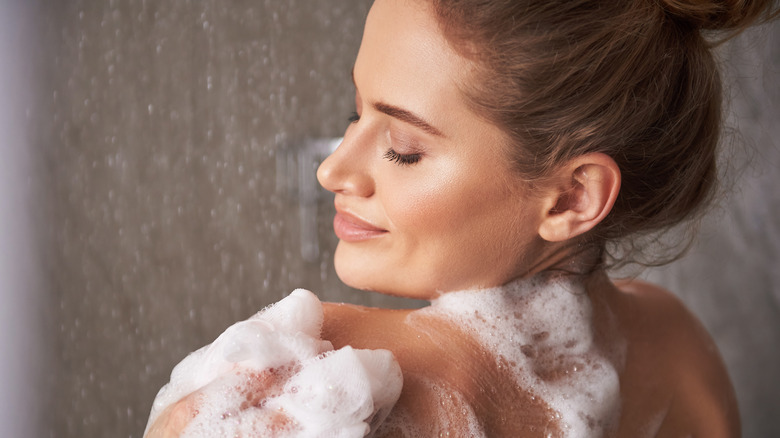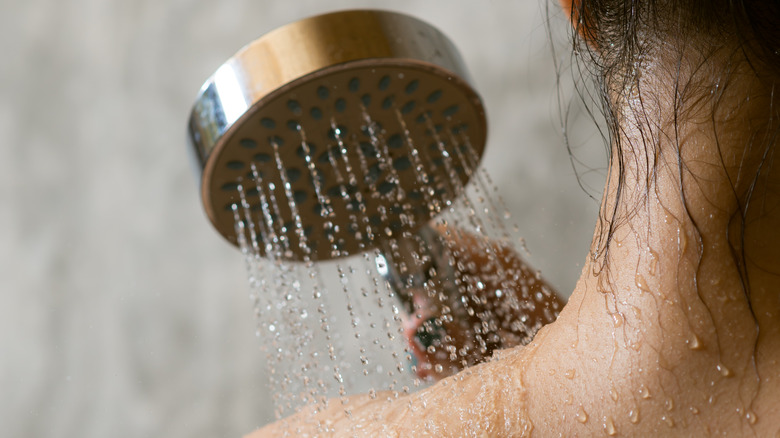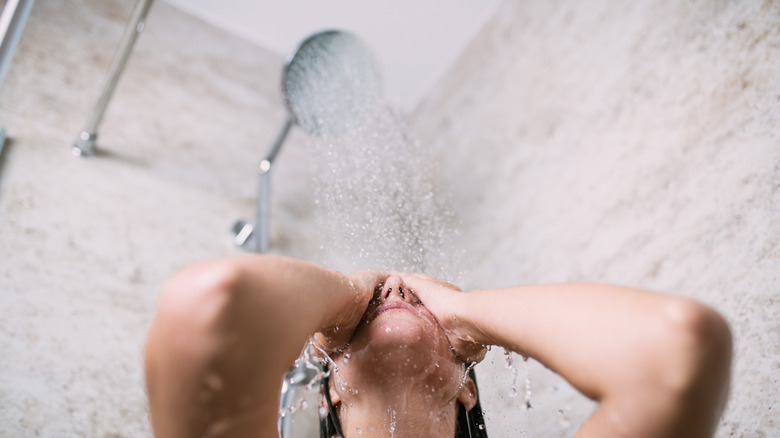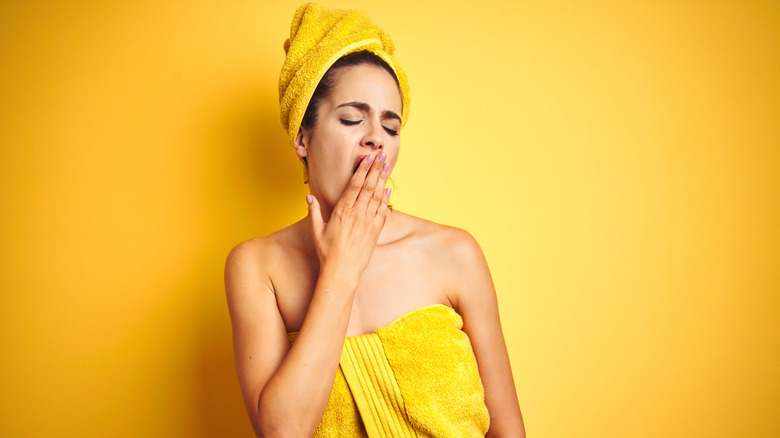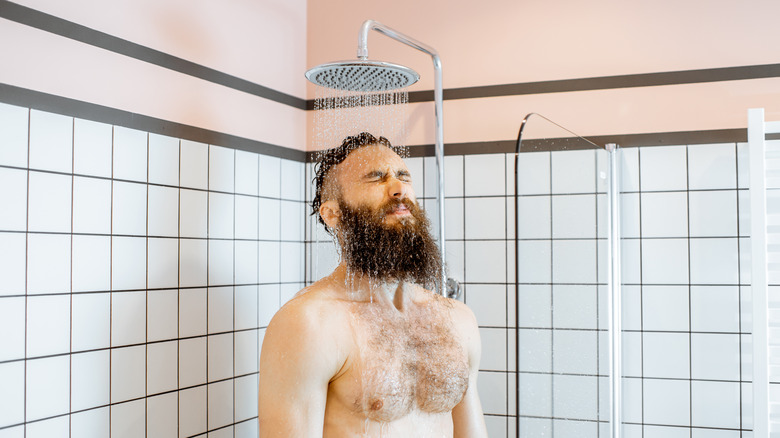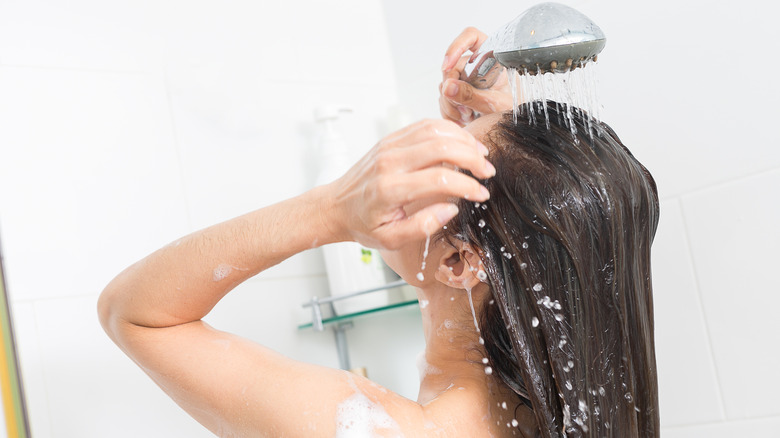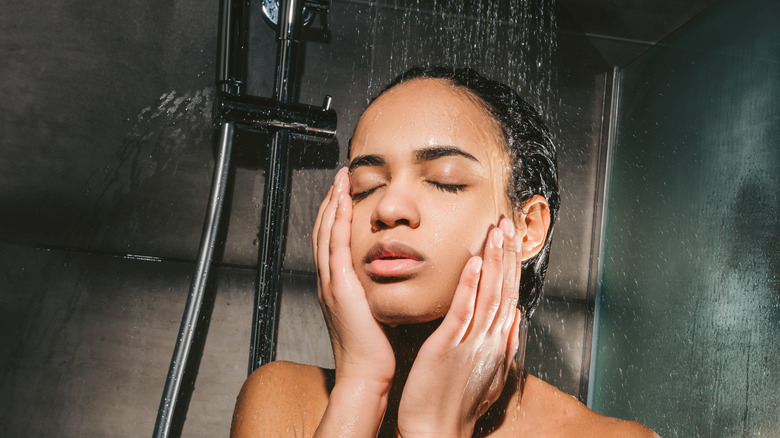How Cold Showers Can Really Change Your Life
Cold showers can apparently be good for you. Though after a long, hard day or a restless night, nothing may sound more appealing than a hot bath or a scalding shower, a cold shower could actually be a better choice.
According to Healthline, cold showers are defined as a shower with a water temperature below 70 degrees Fahrenheit. The best way to experiment with cold showers is to do so slowly. The publication advices gradually lowering the temperature of the water toward the end of your usual shower. Once you get the water to an uncomfortable chill, you'll want to stand beneath the shower head for two to three minutes. During your next shower, you can lower the water temperature even more and try to stand in the water for a couple minutes longer.
"After performing this activity 7 to 10 times, you'll find that you might even look forward to turning the hot water down," Healthline explains. It may not sound like the most pleasant thing in the world, but it could be. Cold showers have a whole lot of benefits to the body and mind and might just change your life. Here's how.
Cold showers can be relaxing
Before you dive into a cold shower, you should know that there are a few risks. Anyone who is at risk of or has a heart disease is advised to avoid taking cold showers. Helene Glassberg, an associate professor at the Perelman School of Medicine at the University of Pennsylvania, told Today that icy showers could put such people at a greater risk for heart attacks and strokes. "If you don't have any underlying medical conditions, then I don't see any harm in trying to do it," physician Tania Elliott added. "I consider it low-risk for most people who would like to try it," Holly Phillips, board-certified general internist, said of the practice when speaking to Refinery29.
One reason you might consider taking a cold shower is for its feel-good benefits. Elliott revealed to Today that cold showers can feel relaxing — especially on sore muscles. "If you think about it, anytime you get injured and want to provide relief to some muscles, often the first thing you do is ice it, so there are certainly benefits of having cold exposure to your body," she continued.
Cold showers can relieve joint pain
Cold showers can work wonders on painful joints. "Cold is best for acute pain; it restricts blood vessels, slowing circulation and reducing swelling," the Arthritis Foundation revealed in an article on its site. "It also numbs nerve endings, dulling pain." Although there are various cold treatments you can try — from localized ice baths to ice packs — you may find a cold shower soothing.
One 2017 study conducted by researchers in Finland found that "whole-body cold mist shower therapy" was helpful for patients with chronic inflammatory arthritis. When it came to both pain reduction and quality of sleep, the volunteers experienced "statistically significant" effects from the treatment. "The new whole-body cold treatment method may offer a safe option for self-treatment of pain at home," the study concluded, "but further study is needed to determine the clinical significance of the effect after longer use." So why not try a cold shower?
Cold showers could help you lose weight
Although you shouldn't look to cold showers as a weight loss technique, bathing in cold water can affect weight loss. One study (via Women's Health) found that people who spent ten days in chilly, 60.8-degree rooms had increased activity in brown fat. And so-called brown fat, which burns calories, has been linked to lower body mass indexes. Another study cited by the publication showed that people who spent two hours a day in 19-degree Celsius (66-degrees Fahrenheit) temperatures lost two pounds in six weeks' time.
Cold showers can, in fact, encourage weight loss. However, Nitin Kumar, an obesity and weight management specialist at HSHS Medical Group, told Women's Health, "You would have to spend a good amount of time in cold water to get even a small benefit."
Spencer Nadolsky, family medicine physician, member of the American Board of Obesity Medicine, and author of the book The Fat Loss Prescription: The Nine-Step Plan to Losing Weight and Keeping It Off, noted that cold showers are not a "miracle breakthrough method" for weight loss. No, you shouldn't expect some kind of major transformation. Nevertheless, you may notice some very gradual weight loss over time.
Cold showers can relieve eczema symptoms
If you have eczema, cold showers are going to be especially beneficial to you. "From a physiological standpoint, your nerves can't transmit multiple sensations at the same time," Tania Elliott, physician and faculty member at New York University Langone Health, revealed to Today. "So if you're itchy and you're cold at the same time, one of those two things is going to take over. Typically the cold sensation will override the itch." You'd experience the same relief if you were suffering from itchy skin not related to eczema. That's not to say cold showers can cure eczema or other skin conditions. Although cold showers provide temporary relief, several doctors confirmed to the publication that cold showers don't provide any lasting benefits to the skin.
Still, hot showers are known to exacerbate eczema symptoms. Jessica J. Krant, assistant clinical professor of dermatology at SUNY Downstate Medical Center and founder of Art of Dermatology in New York City, told Everyday Health that shorter, cooler showers are best. Five-minute showers with the water temperature "turned down two notches from where you want it to be" is ideal, Krant advised.
Cold showers can improve your circulation
When showering or bathing in water that is colder than your body temperature, your body is going to need to work harder to maintain its normal body temperature — and that improves your circulation. "When taken regularly, cold showers can make our circulatory system more efficient," Healthline explained. The publication continued, stating, "It's the same reason that ice brings down inflammation when we bruise or tear a muscle. By bringing the temperature of an area of the body down, we speed up the delivery of warmer, freshly oxygenated blood to that area."
Although this phenomenon happens whether or not you have poor circulation, cold showers are, of course, especially beneficial to those with diabetes, high blood pressure, or other conditions that cause poor circulation. However, if you experience poor circulation as a result of a heart condition, you'll want to avoid cold showers or speak to your doctor to see if they would be right for you.
Cold showers have a positive effect on the mind
You might think that standing under an icy stream of water would lead to a bad mood, but the opposite appears to be true. "I'm not going to be recommending [cold showers] over standard treatments and therapies for depression, but there are some signals of alertness, awakeness and some chemicals in the brain that are activated in the setting of being exposed to cold," Tania Elliott, a physician and faculty member at New York University Langone Health, told Today.
General internist Holly Phillips agrees. "Stepping into a cold shower will cause you to breathe more deeply and boost your heart rate (that's so your body can take in more oxygen and distribute it faster to keep your body warm)," she explained to Refinery29. "This will make you feel more mentally alert, and perhaps more ready to take on the day." Sure, cold showers aren't going to magically improve everything, but it might be enough to give you a small mood boost. And who couldn't use a little pick-me-up from time to time?
Cold showers can reduce stress and alleviate anxiety
One study found that people who participated in winter swimming essentially adapted to "repeated oxidative stress." As such, their bodies have become conditioned to be more adept at handling stress. This isn't just unique to winter swimmers. "Exposure to repeated intensive short-term cold stimuli is often applied in hydrotherapy, which is used in physical medicine for [body] hardening," the study explained. Cold showers work much the same.
Although cold showers can't cure mental health problems, Peter Bongiorno, a naturopathic doctor, revealed in an article for Psychology Today that hydrotherapy can also help alleviate symptoms of anxiety and depression. "I recommend patients with depression to use brief whole-body exposure to cold water in the form of a cold shower," he revealed. Like other experts, Bongiorno recommends starting this process slowly. "Patients can start a shower at a comfortable warm temperature and slowly cool down the water over a 5 minute period down to [68 degrees Fahrenheit] at which point you can sustain for 2 to 3 minutes," he continued.
Cold showers can quell pain and swelling
Researchers in Finland found that winter swimming improved participants' "general well-being." Not only did cold water improve their moods, it also made many feel better physically. "All swimmers who suffered from rheumatism, fibromyalgia, or asthma, reported that winter swimming had relieved pains," the study revealed.
Tania Elliott, a physician and faculty member at New York University Langone Health, told Today that a few small-scale studies have indeed shown that "people who have chronic pain or people with sports injuries" do "actually feel benefits" after taking a cold shower.
Additionally, a report published in the North American Journal of Medical Sciences (via NCBI) revealed that "cold application" can have a local anesthetic-like effect. Cold water can also help to reduce edema, an excess of fluid in the body, as well as swelling. Instead of soaking in a hot bath in an attempt to relieve aches and pains, you may want to consider giving a cold shower a go.
You may use fewer sick days if you take cold showers
It may sound out there, but taking cold showers could mean you'll need to call out of work far less frequently. A study published in 2016 looked at the relationship between cold showers and sickness. In the end, researchers found that those who ended their regular-temperature showers with cold water had a 29 percent reduction in "sickness absence." That figure went up to 54 percent in those who also reported exercising regularly.
Geert A. Buijze, the lead author of the study, explained some of the findings in an interview with Harvard Business Review. "This is a subtle but important point: Participants who took the cold showers actually reported feeling ill just as many days, on average, as the people who showered normally," he revealed. "But either their symptoms were less severe or they felt more energetic, so they were better able to push through the sickness and function anyway." Although the researchers don't exactly understand how, cold showers appear to have a positive effect on the immune system.
Cold showers can fight fatigue
If you've ever been the kind of tired where that double shot of espresso seems to do literally nothing, you may have been desperate enough to splash ice cold water on your face. It turns out that cold water can, in fact, fight fatigue. A report published in the Journal of Strength and Conditioning Research revealed that both contrast water therapy (going from hot water to cold) as well as cold water immersion were able to reduce perceptions or feelings of fatigue in athletes.
Of course, athletes aren't the only ones who suffer from fatigue. An additional study hypothesized that the effects of "cold stress," or cold therapy, could likewise be beneficial to people with chronic fatigue syndrome.
Because of heat's effect on chronic fatigue syndrome, hot showers are not recommended. "One combination of the two energy drainers — standing and heat — is a hot shower," Peter Rowe, director of the Chronic Fatigue Clinic at Johns Hopkins Children's Center in Baltimore, Md., told Everyday Health. "Many of our patients feel that they get dizzy and extremely tired in the shower and often need to lie down on the bed afterward." Shorter, cold showers are instead recommended.
Cold showers may help you fall asleep faster and sleep better
Cold showers are pretty magical considering they can both wake you up and help you fall asleep. It seems paradoxical, but the science behind it makes a whole lot of sense.
"One study by researchers in Lille, a city in northeastern France, found that subjects fell asleep faster and had a better overall quality of sleep following behaviors that cooled the body, such as taking a cold shower right before bed," wrote David K. Randall in the book Dreamland: Adventures in the Strange Science of Sleep (via The Week). If you were to take a hot shower before getting into bed, you'd raise your body temperature. That may not sound like a big deal, but an elevated body temperature can make it that much harder to fall — and stay — asleep. If you've been trying hot baths at night to get some quality rest, you might just have more luck with a cold shower.
Cold showers are better for male fertility than hot baths
Taking fewer hot baths or dips in the hot tub can, according to one 2007 study, improve sperm counts and thus increase male fertility. Of course, this means guys could just skip some scalding showers, but taking cold showers is another viable option. Why? The ideal "testicular temperature" for sperm production is between 88 and 99 degrees, Healthline explained. A cold shower would help the temperature to remain in that zone, whereas a hot shower could raise that temperature too high.
Although cold showers may increase a man's sperm count, it doesn't have the same effect on testosterone. "Cold water isn't going to do anything for your testosterone levels that exercise won't do," the publication explained. "Many other variables affect those levels, such as diet and lifestyle choices like smoking and drinking." While swapping out hot showers for cold showers can allow for an increase in sperm production, movement, and morphology, it's important to note that cold showers aren't "a testosterone level hack."
Cold showers are good for your hair
If you're thinking about switching to cold showers, you may be worried about the impact they're going to have on your hair. But you shouldn't be. While warm water can open up your hair's cuticle and help your shampoo or conditioner penetrate deeper, Blo Blow Dry Bar hairstylist Brittany told Bustle that's really all it does.
"Hot water is not the best for any type of hair, but it can be particularly damaging to hair that has been given the color treatment," Kristen Colòn, hairstylist and co-owner of On Site Studio in Orlando, Fla., penned in an article for HuffPost. "Cooler water is definitely the way to go when it comes time to shampoo and condition your hair, and we can almost guarantee that you will feel as good as your hair looks after getting the cold treatment."
Eva Scrivo, a hairstylist in New York City, revealed to Good Housekeeping that hot water actually lifts the outer cuticle layer of your hair and is a very common cause of color fading. For your hair's sake, stick to cold showers or, at the very least, cold rinses.
Cold showers are great for the face
Cold showers are just as beneficial to your face as they are to your hair. Jessica Krant, a board-certified dermatologist, revealed to HuffPost that you're going to want to stick with lukewarm, if not cold, water when washing your face. Cleansing your skin with cool water may come as a literal shock if you're used to using scalding water, but water that is too hot should be avoided because it will, according to Krant, "strip healthy natural oils from your skin too quickly."
When you switch over to taking cold showers, you may even notice visible changes to your face and skin in general. Healthline explained that some people report that "their skin looks better as a result of cold showers." This is likely due to increased circulation, the publication revealed. If you experience facial puffiness or bloating, washing your face with cold water can make an even bigger difference. Cold water constricts blood vessels and, thus, can reduce swelling.
